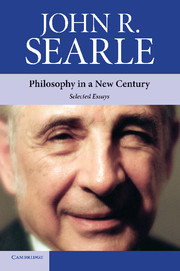Book contents
- Frontmatter
- Contents
- Original place of publication of the essays
- Introduction
- 1 Philosophy in a new century
- 2 Social ontology: some basic principles (with a new addendum by the author)
- 3 The Turing Test: fifty-five years later
- 4 Twenty-one years in the Chinese Room
- 5 Is the brain a digital computer?
- 6 The phenomenological illusion
- 7 The self as a problem in philosophy and neurobiology
- 8 Why I am not a property dualist
- 9 Fact and value, “is” and “ought,” and reasons for action
- 10 The unity of the proposition
- Name index
- Subject index
- References
2 - Social ontology: some basic principles (with a new addendum by the author)
Published online by Cambridge University Press: 05 June 2012
- Frontmatter
- Contents
- Original place of publication of the essays
- Introduction
- 1 Philosophy in a new century
- 2 Social ontology: some basic principles (with a new addendum by the author)
- 3 The Turing Test: fifty-five years later
- 4 Twenty-one years in the Chinese Room
- 5 Is the brain a digital computer?
- 6 The phenomenological illusion
- 7 The self as a problem in philosophy and neurobiology
- 8 Why I am not a property dualist
- 9 Fact and value, “is” and “ought,” and reasons for action
- 10 The unity of the proposition
- Name index
- Subject index
- References
Summary
THE PROBLEM OF SOCIAL ONTOLOGY
The aim of this chapter is to explore the problem of social ontology. The form that the exploration will take is a development of the argument that I presented in The Construction of Social Reality (Searle, 1995). I will summarize some of the results of that book and then develop the ideas further.
First of all, why is there a problem about social ontology at all? We are talking about the mode of existence of social objects such as the United States of America, the San Francisco Forty Niners football team, the University of California and the Squaw Valley Property Owners Association, as well as such large-scale institutions as money or private property. We are also talking about social facts, such as the fact that I am a citizen of the United States, that the piece of paper that I hold in my hand is a $20 bill, and that France is a member of the European Union. We are also talking about social processes and events, such as the presidential election campaign, the collapse of communism and the last World Series. We are talking, in short, about social facts, social objects, and social processes and events. To repeat the question, why is there a problem about these phenomena?
Information
- Type
- Chapter
- Information
- Philosophy in a New CenturySelected Essays, pp. 26 - 52Publisher: Cambridge University PressPrint publication year: 2008
References
Accessibility standard: Unknown
Why this information is here
This section outlines the accessibility features of this content - including support for screen readers, full keyboard navigation and high-contrast display options. This may not be relevant for you.Accessibility Information
- 2
- Cited by
